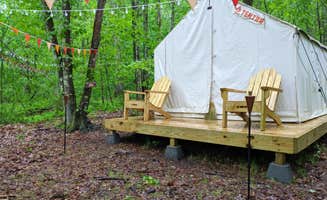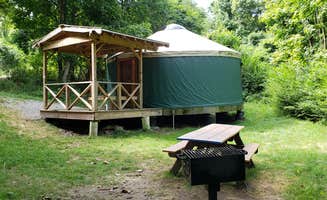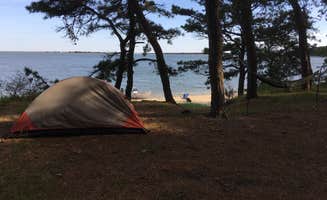Tent camping options around Riverside, Rhode Island extend beyond established campgrounds into secluded natural settings. Rhode Island's humid continental climate creates distinct camping seasons, with summer temperatures averaging 70-85°F and winter lows frequently below freezing. Campsites in this region of southern New England typically feature mixed hardwood forests with oak, maple, and pine trees providing natural shade during warmer months.
What to do
Kayak fishing: Access Wakefield Pond from Buck Hill Campground where the water remains "clean and fine for swimming with a few areas that make for easy entry into the water," according to camper Greg R. The pond supports various fish species accessible from shoreline or small watercraft.
Island exploration: Visit Boston Harbor Islands State Park Campground for day trips from mainland sites. "During the day you can take small ferries to a variety of other islands to go swimming or explore. This is a great adventure for kids," notes Martha H. Reserve ferry tickets in advance as schedules can be limited.
Beach bonfires: Gather driftwood below the high tide line at Washburn Island Campsites for evening fires. "Fire pits at each site with wood on sale at the ranger hut," mentions Tim C., who visited during shoulder season when sites were largely unoccupied. Check current fire regulations before planning.
What campers like
Uncrowded camping experiences: Shoulder season visits (May, September, October) to coastal campgrounds yield quieter experiences. Tim C. noted at Washburn Island: "Camped there May 20-25 and there were only 1-2 other sites being used." Many Rhode Island campgrounds operate seasonally, with prime availability outside peak summer months.
Fort exploration: Historic military installations provide unique exploration opportunities. While visiting Boston Harbor Islands, camper Jess G. shared, "Exploring the island was awesome. We found all kinds of bunkers and a brick house." These structures offer shelter during sudden weather changes and educational value for history enthusiasts.
Primitive experience with basic comforts: Many tent campers appreciate sites balancing seclusion with minimal amenities. Buck Hill Campground provides "large clusters that can accommodate 10+ tents" with "a few rough restrooms and some porta-potties," allowing groups to spread out while maintaining basic sanitation access.
What you should know
Transportation logistics: Reaching island campsites requires careful planning. For Boston Harbor Islands, Jess G. advises: "We took all of our gear on the T to the harbor by the aquarium. We then took the ferry to Georges Island. After that we waited and got on a much smaller island [ferry]." Allow extra transit time between connections.
Reservation systems vary: While some sites like Frosty Hollow Camping Area accept reservations, others operate first-come basis. Island campsites often have limited capacity requiring advance booking. Tim C. notes, "Campsites can be reserved 6 months in advance so it is tough to get one during summer months."
Water access considerations: Not all campgrounds provide potable water. Martha H. explains at Peddocks Island "there is plenty of drinking water available and a ranger station," while Jess G. cautions at Lovells Island to "make sure that you bring enough drinking water." Verify water availability before arrival to determine how much to carry in.
Tips for camping with families
Pack extra transportation: Wheeled carts help children manage gear transfers, especially for ferry-accessed sites. One camper recommends, "If you have a folding wagon, you may appreciate having it to carry items on and off the ferry and to your site on the island."
Check for Junior Ranger programs: Several campgrounds participate in educational initiatives. While camping at LeGrand Reynolds Horsemen's Camping Area, families can "earn a Junior Ranger badge from the National Park Service" through activity completion at nearby ranger stations.
Consider yurt options: For families new to camping, semi-permanent structures provide comfort with outdoor access. Martha H. describes Peddocks Island accommodations: "The yurts have bunk beds, a floor lamp, a table inside, a picnic table outside and a grill. Just getting to the island is a fun adventure."
Tips from RVers
Limited RV access: Most tent camping areas near Riverside cannot accommodate recreational vehicles. Instead, RVers should check at Water's Edge Campground which offers both tent sites and hook-up options with drive-in access, providing flexibility for mixed camping groups.
Consider seasonal closures: Many Rhode Island campgrounds operate limited schedules. Frontier Family Camper Park runs from May 1 to September 30, while Waquoit Bay Reserve operates "mid May to Columbus Day," according to reservation information. Verify operational dates before planning off-season RV trips.




